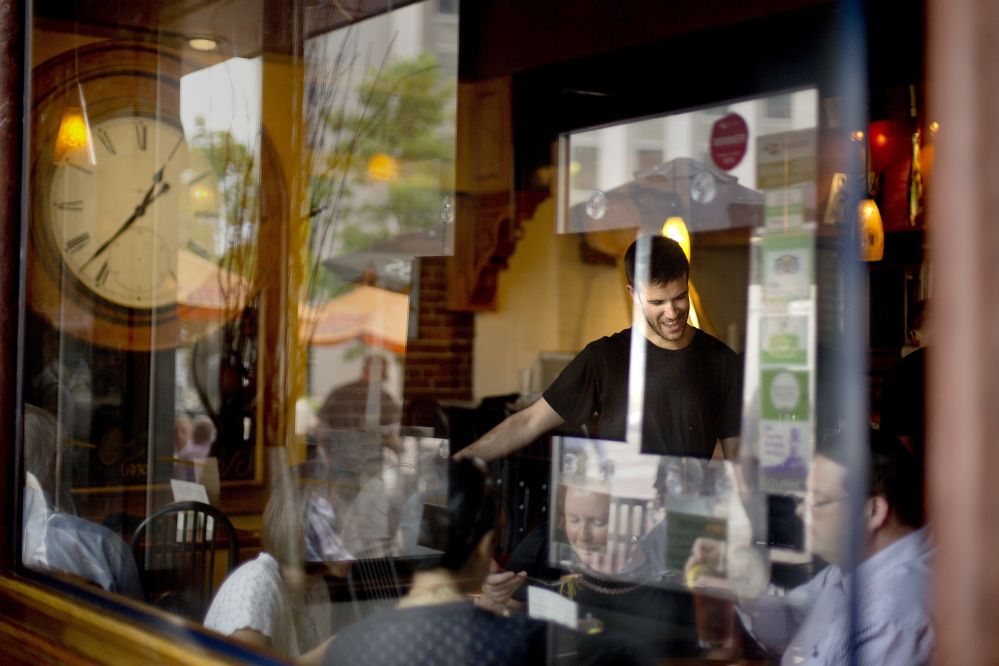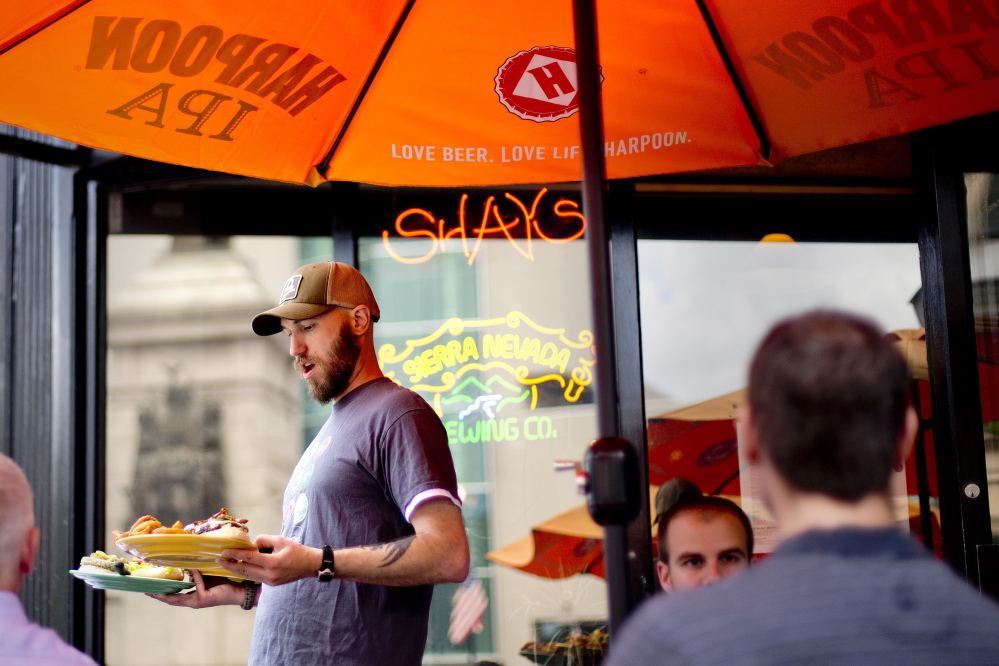A proposal headed for the ballot in November sounds like good news for Portland workers who rely on tips. If it passes, their base hourly wage would triple from $3.75 to $11.25.
But food servers and bartenders in the city’s bustling downtown restaurant district said Thursday they’re less than excited about the idea. The proposal could actually reduce their overall incomes, several servers said, because diners – especially locals who support them during the offseason – would eat out less and might be far less generous with tips.
“That’s insane,” said Melissa Cyr, a 33-year-old bartender at Three Dollar Dewey’s on Commercial Street. An $11.25 base wage for tipped staff could raise prices for food and beer to a point where her loyal regular customers would not be able to afford to come out as often, and those who do could decide tips are optional, she said. “No one would tip us.”
Two minimum wage proposals are under consideration for Portland workers, an ambitious $15-an-hour plan that’s headed for the ballot in November and a more modest proposal due for City Council action in September.
Much of the council’s debate has centered around whether tipped employees should be included at all in a minimum wage hike, or whether the special $3.75 base wage should remain. Currently, employers must pay tip earners more than the base wage if income from tips doesn’t push them above the state minimum wage of $7.50 an hour.
Given Portland’s relatively strong job market, a small percentage of city workers is expected to be directly affected by a minimum wage hike. But Portland’s thriving restaurant industry employs an army of servers who would be directly affected by any increase in the base wage for tip earners.
Restaurant owners have strongly opposed increasing the base wage of servers, saying they do so well on tips that they are the highest-paid employees in the industry. Other groups, such as the Maine Women’s Lobby, believe they should be included in a wage increase.
The City Council passed an ordinance July 6 that will increase the citywide minimum wage to $10.10 an hour. But the ordinance included language that inadvertently raised the minimum base wage for tipped employees to $6.35, so councilors may change the ordinance to keep the server minimum at $3.75 or possibly raise it to $5.05. Further action has been postponed until September.
The Portland Green Independent Committee, meanwhile, has collected enough signatures for a citywide vote that would raise the minimum wage to $15 an hour – with tipped workers earning a minimum of $11.25.
Interviews with more than a half-dozen tipped workers at diners, pubs and high-end restaurants in Portland’s downtown mostly agreed that servers can make at least $20 an hour over the course of a year – mostly from tips. Some feared that an $11.25 base wage would prompt restaurant owners to simply eliminate tipping to offset price increases for customers or cut back on happy hour specials, which often lure locals in the offseason.
‘MOST RESTAURANTS STRUGGLE’
Sylvan Vogel, a 31-year-old bartender from South Portland who works at Shay’s Grill Pub in Monument Square, worries that some restaurants wouldn’t be able to afford the wage increase and may lay off workers, or close.
“It’s probably not a great idea,” Vogel said. “I know how most restaurants struggle to keep things afloat. It’s not an easy business.”
While most of the workers interviewed Thursday were concerned, an exception was Matt Brown, a 26-year-old server at David’s Restaurant in Monument Square. Brown worked for a year at a ski resort in California, where he was paid a base wage of more than $9 an hour and still got tips averaging 20 percent of the meal checks.
“Getting paid more? I’m all for it,” said Brown, of Portland. “People might tip the same, and you’re making more money.”
The $15 minimum and $11.25 base wage are being promoted by the Portland Green Independent Committee, which says it wants to ensure a livable wage. The $15 minimum is a figure that is gaining momentum among higher-wage advocates around the country.
Tom MacMillan, chairman of the Portland Greens, believes servers would offer different opinions if they were not identified or interviewed in their workplaces, because they fear that being honest may cost them their jobs. He said servers he has spoken to are all in favor of an increase in their hourly wages.
“You’re reaching people in a compromised position,” MacMillan said. “They told you what the boss wanted to hear, for sure. When the boss isn’t looking, people say very different things.”
MacMillan, who is a candidate for mayor, pointed to data from the U.S. Bureau of Labor Statistics reporting that the mean hourly wage for tipped workers in restaurants and other eating establishments nationwide was $10.25 an hour – less than half the $20 to $40 an hour that Portland workers claimed to earn.
MacMillan also emphasized that the minimum wage increase proposed by the Greens would benefit thousands of other service-sector employees who in many cases make less than $15 an hour.
‘I CAN’T AFFORD A PAY CUT’
But Averil Burner, a 25-year-old bartender at David’s Restaurant, believes that increasing the minimum wage for tipped workers would create a public perception that servers are well-off.
Sarra Maddocks, a bartender at Buck’s Naked BBQ and Steakhouse on Wharf Street, also fears that she would lose tips, leading to a pay cut. She fears there could be an industry-wide push to simply pay tipped workers the full minimum wage and eliminate tipping altogether – a move that MacMillan said would be illegal.
“I can’t afford a pay cut. I have two dependents,” said Maddocks, of South Portland.
Ross Hammond, a 24-year-old server at Becky’s Diner on Commercial Street, said that increasing the base wage to $5 or $6 an hour “probably wouldn’t be a terrible idea,” since it would provide more wage security in the winter months. But he opposed an increase to $11.25 for the same reasons as other servers.
Hammond also thought a higher wage could lead to poor customer service, because the reliance on tips means workers put in extra effort.
“There could be some people who take advantage of that and not work as hard,” he said. “I’d hope that wouldn’t be the case with most people, though.”
Send questions/comments to the editors.






Comments are no longer available on this story